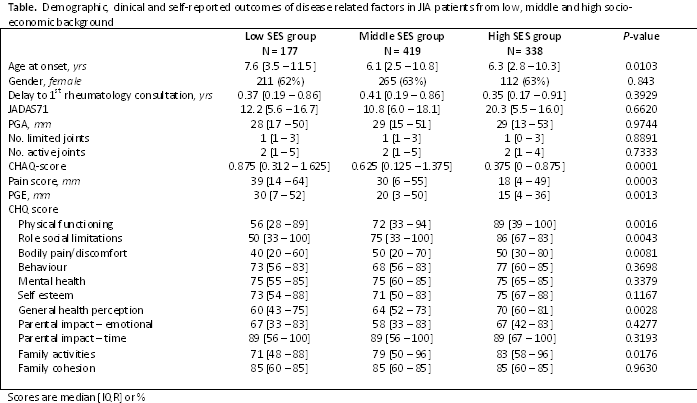Session Information
Session Type: Abstract Submissions (ACR)
Background/Purpose: It has been suggested that socio-economic status (SES) may be associated with delayed to access to rheumatology care and with worse disease severity in patients with juvenile idiopathic arthritis (JIA). The objectives of this study were to examine the association between SES and delay to rheumatology clinic and disease severity in patients with JIA in England.
Methods: Consecutive children from the Childhood Arthritis Prospective Study (CAPS), a large prospective longitudinal inception cohort study, were included. At baseline, a clinical examination was performed including the physician’s global assessment (PGA), number of active and limited joints and JADAS71. The CHAQ, pain score, the parental general evaluation (PGE) and the CHQ, including several physical and psychosocial concepts (higher scores indicate better functioning and well-being), were completed by the child or parent. Using postcode data, SES was determined by calculating the Index of Multiple Deprivation score (IMD). Based on the ranking of the IMD score, patients were included in the low SES group (lowest quartile), middle SES group (two middle quartiles) and high SES (highest quartile). Differences in demographic and disease characteristics between these three groups were statistically tested applying the Kruskal-Wallis test or Chi-square test for gender.
Results: 934 JIA patients with a median age of 6.8 [IQR 2.9 – 10.9] yrs at baseline were included in this study. At baseline the percentage of patients according to the ILAR subtypes for the low, middle and high SES classes were, respectively: systemic (3.6%, 6.8%, 8.0%), oligoarthritis (54%, 51%, 48%), extended oligoarthritis (1.6%, 2.4%, 2.5%), polyarthritis RF- (13.6%, 18.4%, 19.0%), polyarthritis RF+ (4.2%, 2.9%, 2.5%), enthesitis related arthritis (4.2%, 5.8%, 5.5%), psoriatic arthritis (6.1%, 4.2%, 5.5%), undifferentiated (7.2%, 5.8%, 4.9%), other (5.5%, 3.2%, 4.3%). There was no difference in delay to first rheumatology consultation between the three SES groups. Although no significant differences in diseases activity scores assessed by the rheumatologist were observed between the three SES groups, children and/or parents of children with JIA in the low SES group recorded higher pain scores, disease activity scores and lower physical function scores than those in the high SES group. SES did not seem to impact on psycho-social outcomes as measured in the CHQ.
Conclusion: Patients from lower SES background score their disease activity and functional disability higher than patients from higher SES background, whereas no differences were found in disease activity scores obtained in clinic between the different SES groups. This study suggests that it is important to take SES background into account when patients with JIA present to the clinic for the first time.
Disclosure:
S. Verstappen,
None;
J. Cobb,
None;
H. E. Foster,
None;
E. Baildam,
None;
L. R. Wedderburn,
None;
J. Gardner-Medwin,
None;
A. Chieng,
None;
J. Davidson,
None;
W. Thomson,
None;
K. L. Hyrich,
None.
« Back to 2012 ACR/ARHP Annual Meeting
ACR Meeting Abstracts - https://acrabstracts.org/abstract/patients-with-juvenile-idiopathic-arthritis-from-a-low-socio-economic-background-perceive-their-disease-activity-and-physical-limitations-higher-than-patients-from-a-high-socio-economic-backgroun/

